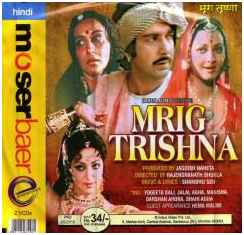The Colourful Filmmaker From Lucknow
A long time ago: video of Mrig Trishna

This is the time of the year when countless creatures crawl out of hibernation from often colourful closets. It is springtime after all and Lucknow too celebrates the end of yet another winter season by enjoying multiple festivities from food to special film shows.
Amongst other people to emerge out of obscurity this new year is RN Shukla, lad from Lucknow and part of the first batch of enthusiasts to graduate from Pune's Film and Television Institute of India (FTII) in 1964.
“I was okay looking so most people thought that I want to be an actor,” says Shukla, 76 who studied screenplay writing and film direction at the FTII.
His family of feudal landlords in the suburbs around Lucknow was shocked at Shukla's determination to make films.
To watch films was bad enough for this traditional family but to have one of their own make films was comparable only perhaps to sin. But Shukla had already had a sneak peak at Baiju Bawra, Vijay Bhatt's 1952 film of a mesmerising court musician from medieval times. Without thinking twice he turned his back on a career in the Air Force and marched to the FTII instead. There he discovered the films of Federico Fellini, Italian film director and scriptwriter and remained wide eyed over the work of other master filmmakers from around the world.
The three years that he spent at the FTII convinced him that nothing mattered more to him in life than to search for the secret of existence in the dark of a cinema house. To this day Shukla remains in awe of La Dolce Vita, the comedy drama from 1960 by Fellini.
His guide at the FTII was Ritwik Ghatak, the Bengali film maker whose cinema is remembered for its depiction of reality as he saw it. Under the watchful eye of Ghatak, Shukla filmed Rendezvous, a philosophical diploma short on love, life and longing that is now part of a prestigious list of films compiled by the FTII as an everlasting tribute to celluloid, the primary moving image medium of our times.
Shukla's return from the FTII to Lucknow in 1964 coincided with the making of Shakespeare Wallah by Merchant Ivory here who immediately hired Shukla as assistant director.
In the following decade, Shukla concentrated mainly on documentaries including a rare short on Vinoo Mankad, the opening batsman and graceful left arm bowler responsible for once scoring 413 runs with Pankaj Roy in 1956.
Mrig Trishna or mirage from 1975 is Shukla's first and last feature film that stars Yogeeta Bali Jalal Agha and introduces to the screen Tom Alter now thespian actor on stage as well as screen. Based on Rajasthani folk lores and popular legends of Uttar Pradesh, Mrig Trishna is memorable for a stunning dance performance by dream girl Hema Malini that is choreographed by Saroj Khan before the latter became a celebrity.
The film is special in the way it attempts to explore the human quest for that desperate but elusive state of everlasting equanimity. The success of Mrig Trishna lay in Shukla's attempt to blend the obvious with the occult as conflict between loyalty and ambition is shown playing out against the background of the 1857 war of liberation waged by people against the British in India.
Mrig Trishna won for Shukla the sixth Dada Saheb Phalke Award for the best maiden directorial achievement in 1976.
Despite similar accolades, for some reason Shukla soon began to evaporate from the sets and over time he returned to Lucknow with little except thoughts on continuing to make the kind of cinema that best shows human desire trying to understand life a little more.
Today he can be found seated in his home in a back alley of yet another congested neighbourhood carved out in the city from scything more land that must have once been a lush field filled every harvest with good grains and plenty of pulses.
Circumstances may have evicted Shukla out of center stage of the way films are made these days but his dream refuses to die of bringing to screen his idea of a secular India that includes the unfolding of almost 6000 years of history of South Asia.
“The script is ready. I have recorded two songs but when the film with the working title of Dharam Nirpeksh Bharat will see the light of day remains as elusive as the beginning of life itself,” smiles Shukla.



